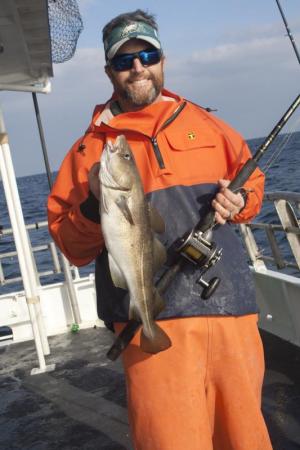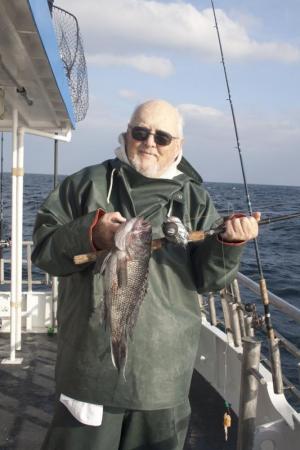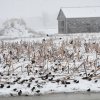On Tuesday afternoon, I headed north to my son Roger’s home in Freehold, N.J., so we could fish together Wednesday. It is only a three-hour trip, and I arrived just in time for dinner.
After wearing myself out playing with my two grandchildren, I hit the sack early for the 2:30 a.m. wakeup call.
We were on the road by 3 a.m., and after the obligatory stop at Wawa, we arrived at the Jamaica II in Brielle, N.J., by 4 a.m. The boat was set to leave at 5 a.m., and there were already two anglers on board when we got there. Roger quickly picked out our two fishing spots on the stern, and we then carried our gear into the cabin.
Rog and I were concerned that we wouldn’t have enough anglers to make the trip, but at 4:55, we heard the sound of a diesel engine firing up, and with only 12 anglers on board we were underway.
After a two-and-a-half hour run, the captain set out two anchors and we began fishing over a wreck that was supposed to hold big sea bass. The wind was north 15 to 20 with seas running three to four with a few fives and sixes thrown in just to keep you awake, but with two anchors down we sat reasonably still. I had called ahead to ask what size sinker I would need, and the captain said 10 ounces. The largest I had were eights, so after dropping $21 at my favorite tackle shop, I now had six 10-ounce sinkers. That was all I needed, as they held bottom all day.
The big sea bass did not show and in their place were multitudes of spiny dog sharks. Every drop in 140 feet of water produced a dog or an empty hook. The captain moved on the anchors several times, then pulled the anchors and tried another wreck, but the results were the same.
When it appeared we might not catch anything else except dogs, I decided to keep one of the larger ones. Roger and I cleaned it by first cutting off the head, then removing the guts and the bloodline along the backbone. You must do this before the shark dies or the uric acid in the blood will get in the meat and make it uneatable. My wife made her famous sweet and sour shark on Friday.
Finally, the captain gave up on the sea bass and ran inshore to the Mud Hole to try for ling. On my first drop, I caught sea bass. Roger’s first drop produced a cod that ended up winning the pool.
Rog and I fished side by side. He was catching ling and I was catching tiny bergalls. I believe I was high hook on bergalls, although I never had one longer than six inches.
The captain blew the three horns around 3 p.m., and we were back at the dock at 5 p.m. to end our 12-hour trip. Rog had his cod, I had my sea bass and shark, and we spilt his ling, so we both came home with fish. The mates cleaned the catch on the way in, and I was home before noon on Thursday.
Surf-fishing permits
The cost of surf-fishing permits is going up. The Division of Parks and Recreation will be raising the fee $10 for Delaware residents and $20 for nonresidents beginning in February. There will be a meeting at 9:30 a.m., Thursday, Jan. 17, at the Dover Public Library, where Parks and Recreation staff will present a program on the increase. The public will be allowed to comment.
Parks and Recreation also plans to limit the number of permits sold in 2019 to 17,000. Last year, they sold 17,104 permits. The reason given for the limit is to prevent overcrowding, but exactly how much of an effect 104 fewer permits is going to have on Fourth of July weekend remains to be seen.
Fishing report
Tog are being caught when boats can get out. Some big fish are coming into Lewes and Indian River, with citations taken on almost every trip.
The striped bass situation is pretty bleak. The last good report I had came from New Jersey, and that was two weeks ago. The surf and the inlet are both dead.
They are catching good numbers of rockfish in Virginia. The best action has been drifting eels out of Cape Charles, where 50-pounders are not uncommon. The rest of the lower Chesapeake Bay holds smaller rockfish than may be caught by casting under birds, or working plugs or bucktails around the Chesapeake Bay Bridge-Tunnel.























































